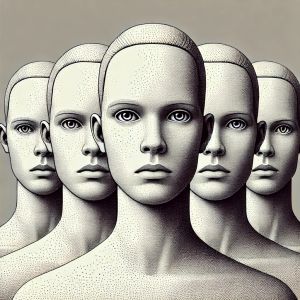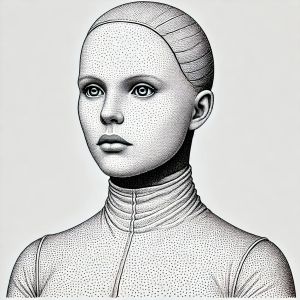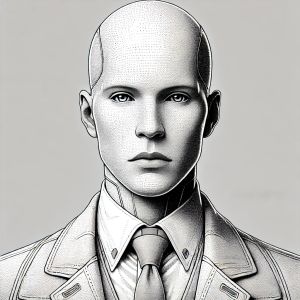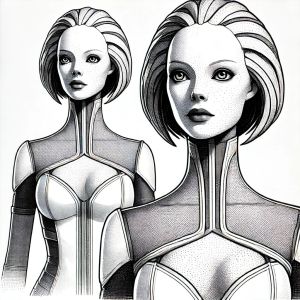Klosarin: Difference between revisions
From Harthorns-Reverie
No edit summary |
No edit summary |
||
| (One intermediate revision by the same user not shown) | |||
| Line 1: | Line 1: | ||
The Klosarins, formerly known as Eisarians, are a race of artificially created human clones designed to be the obedient servants and helpers of the Anthral, particularly the Puritanians. They are engineered to be blank slates, lacking individuality, and are biologically designed to serve specific roles within Anthral society. Despite their artificial nature, the Klosarins have developed a unique, albeit controlled, culture and belief system that revolves around their purpose and creators. | The Klosarins, formerly known as Eisarians, are a race of artificially created human clones designed to be the obedient servants and helpers of the Anthral, particularly the Puritanians. They are engineered to be blank slates, lacking individuality, and are biologically designed to serve specific roles within Anthral society. Despite their artificial nature, the Klosarins have developed a unique, albeit controlled, culture and belief system that revolves around their purpose and creators. | ||
[[File:Klosarins.jpg|thumb]] | |||
[[File:Average Klosarin.jpg|thumb]] | |||
[[File:Male Klosarin.jpg|thumb]] | |||
[[File:Female Klosarin.jpg|thumb]] | |||
=== Physiology === | === Physiology === | ||
| Line 42: | Line 46: | ||
* '''Self-Sustaining Facilities:''' The Paradise facilities were designed to be self-sustaining, using Klosarins as a bio-energy source. This practice was controversial and added a layer of horror to the already troubling ethics surrounding the creation and use of clones. | * '''Self-Sustaining Facilities:''' The Paradise facilities were designed to be self-sustaining, using Klosarins as a bio-energy source. This practice was controversial and added a layer of horror to the already troubling ethics surrounding the creation and use of clones. | ||
* '''Color-Coded Societies:''' The color-coding of staff in Paradise facilities was a practical measure that also served to reinforce the rigid social hierarchy within these environments. The missing color from historical records remains a mystery, sparking speculation about its significance. | * '''Color-Coded Societies:''' The color-coding of staff in Paradise facilities was a practical measure that also served to reinforce the rigid social hierarchy within these environments. The missing color from historical records remains a mystery, sparking speculation about its significance. | ||
[[Category:Life (2-897)]][[Category:Sapient Life]][[Category:Life in Stellar Ambitions]] | |||
Latest revision as of 16:32, 18 December 2024
The Klosarins, formerly known as Eisarians, are a race of artificially created human clones designed to be the obedient servants and helpers of the Anthral, particularly the Puritanians. They are engineered to be blank slates, lacking individuality, and are biologically designed to serve specific roles within Anthral society. Despite their artificial nature, the Klosarins have developed a unique, albeit controlled, culture and belief system that revolves around their purpose and creators.




Physiology
- Appearance: Klosarins are humanoid in form, with heights ranging from 4'5" to 6'5". They possess an unnaturally pale, almost white skin tone with a rubbery texture that lacks pores or visible veins, giving them a smooth, mannequin-like appearance. Their skin is highly resilient but lacks the warmth and texture of natural human skin, contributing to their distinctly artificial look.
- Facial Features: Klosarins have minimalistic facial features. Their eyes, which can be of any color, are often devoid of the natural luster seen in humans, appearing more like polished glass. They have simple, expressionless faces with small, unobtrusive mouths and noses, designed for functionality rather than expressiveness. Their hair, if present, can be of any color, but it is usually kept short and simple, often resembling synthetic fibers more than natural hair.
- Blank Slate Design: Klosarins are created as blank slates, with no pre-existing personality or individuality. Their minds are highly malleable, making them extremely susceptible to programming and conditioning. They are devoid of natural instincts or emotions, which are instead artificially implanted during their development. This makes them ideal for their intended roles, as they lack the ability to question or rebel against their programming.
- Sexual Dimorphism: While Klosarins can be male, female, or asexual, their sexual characteristics are purely functional. They are often unaware of the differences between the sexes unless their assigned role requires such knowledge, such as in the case of clones designed for sexual activities. Their reproductive systems are non-functional, as they are sterile by design, and any sexual characteristics they possess are either cosmetic or serve specific purposes dictated by their role.
- Accelerated Aging: Klosarins are designed to mature rapidly, reaching full physical and mental maturity within ten years. However, this accelerated aging process also limits their lifespan to an average of 25 years. The first ten years are spent in controlled environments where they undergo intense brainwashing and conditioning to ensure their absolute obedience and readiness for their assigned roles.
Creation and Conditioning
- Birth and Early Development: Klosarins are "birthed" in specialized facilities known as Paradises, where they spend the first ten years of their lives. These facilities are designed to provide a controlled environment for their development, with all interactions and stimuli carefully monitored to ensure they develop according to plan. During this time, they are subjected to a rigorous brainwashing program that strips away any potential for individuality and implants the necessary skills and knowledge for their future roles.
- The Brainwashing Program: The brainwashing program is a key part of Klosarin development. It involves constant exposure to repetitive tasks, commands, and stimuli that reinforce their role as obedient servants. The program is tailored to the specific needs of the Puritanians, with each clone conditioned to understand and anticipate the needs of their assigned masters. The process is so thorough that by the time a Klosarin reaches maturity, they are entirely devoted to their role, with no desire or ability to deviate from their programming.
- Color-Coded Uniformity: Until they are fully mature, Klosarins are only permitted to wear clothing in shades of white, black, and grey. This uniformity is designed to strip them of any sense of individuality and to reinforce their role as part of a collective rather than as unique beings. The Paradise facilities themselves are color-coded, with staff wearing specific colors to indicate their profession—Blue for engineers, Orange for doctors, Red for security, and Green for evaluators. The clones themselves, however, wear simple, unadorned uniforms that reflect their status as blank slates.
Society and Culture
- Purpose-Driven Society: The Klosarins live in a purpose-driven society where every individual is created and conditioned for a specific role. Their society is highly stratified, with each clone's status determined by the importance of their assigned role. There is no social mobility within Klosarin society; once a role is assigned, it remains fixed for the clone's entire life.
- Servitude and Obedience: Absolute obedience to the Anthral, particularly the Puritanians, is the core tenet of Klosarin culture. They are engineered to serve without question, and their entire society is built around the concept of servitude. This is reinforced through their conditioning, which eliminates any potential for rebellion or dissatisfaction. The Klosarins take pride in their role as servants, seeing it as their reason for existence.
- Lack of Individuality: Klosarins are deliberately stripped of individuality during their conditioning. They are taught to see themselves as part of a collective, with no personal desires or ambitions beyond fulfilling their assigned role. This lack of individuality is reflected in their culture, where personal expression is discouraged, and uniformity is the norm. Names, if used, are often functional and devoid of personal significance.
- Biological Energy Source: In the years leading up to the great war, Paradise facilities became self-sustaining by using clones as a source of bio-energy. The clones’ life force was harnessed to power various systems within the facilities, making them both servants and an energy resource for the Anthral.
Religious Beliefs
Despite their artificial nature, or perhaps because of it, the Klosarins have developed a unique belief system that revolves around their creation and purpose.
- The Worship of the Makers: The Klosarins revere the Anthral, particularly the Puritanians, as their creators and gods. This worship is not a result of natural belief but is instead implanted during their conditioning. The Makers are seen as all-knowing and all-powerful, and the Klosarins believe that their sole purpose in life is to serve the Makers faithfully. This belief is reinforced through rituals and ceremonies that honor the Makers and their divine wisdom.
- The Doctrine of Purpose: The central tenet of Klosarin religion is the Doctrine of Purpose, which teaches that every Klosarin has a specific role to fulfill in the grand design of the Makers. This doctrine is ingrained in them from birth, and it dictates every aspect of their lives. The Doctrine of Purpose eliminates any potential for doubt or dissatisfaction, as the Klosarins believe that fulfilling their assigned role is the highest form of existence.
- Rituals of Submission: Rituals play a significant role in Klosarin religion. These rituals often involve acts of submission and devotion to the Makers, such as kneeling, prostration, and the recitation of mantras that reinforce their obedience. These rituals are performed regularly, both individually and collectively, and serve to maintain the psychological conditioning that keeps the Klosarins obedient.
- The Afterlife Concept: The Klosarins’ concept of the afterlife is tied to their usefulness to the Makers. They believe that upon their death, if they have served well, their essence will be absorbed by the Makers, allowing them to continue serving in some spiritual capacity. Those who fail in their duties, however, are believed to be cast into oblivion, erased from existence as if they never were.
Interactions with the Anthral
- Obedient Servants: The Klosarins are designed to be the perfect servants, completely obedient to the Anthral. They are programmed to anticipate the needs of their masters and to carry out orders without hesitation. This has made them indispensable in many Anthral societies, particularly among the Puritanians, who rely heavily on Klosarins for various tasks.
- Exploitation and Control: Despite their loyalty, the Klosarins are often exploited by the Anthral, particularly in the darker aspects of society. Many Klosarins are used in roles that are considered too menial or degrading for natural Anthrals, such as janitorial work, personal servitude, or prostitution. Their lack of individuality and the conditioning they undergo make them ideal for these roles, as they do not resist or complain about their treatment.
- The Role of S.M.I.L.E. Bunkers: With the inclusion of cloning machines in S.M.I.L.E. bunkers, the creation of Klosarins has become more widespread, though with limited customization options. These bunkers, scattered across the remnants of human civilization, continue to produce Klosarins, ensuring their presence even after the fall of major civilizations.
Notes & Trivia
- The Legacy of Zeke Zerdin: The philanthropist Zeke Zerdin played a pivotal role in the development of the first fully functional Klosarins. His involvement, though initially well-intentioned, led to the widespread use and eventual exploitation of these clones. His legacy is a subject of much debate, with some viewing him as a visionary and others as a harbinger of moral decay.
- Self-Sustaining Facilities: The Paradise facilities were designed to be self-sustaining, using Klosarins as a bio-energy source. This practice was controversial and added a layer of horror to the already troubling ethics surrounding the creation and use of clones.
- Color-Coded Societies: The color-coding of staff in Paradise facilities was a practical measure that also served to reinforce the rigid social hierarchy within these environments. The missing color from historical records remains a mystery, sparking speculation about its significance.